Having a well-equipped garage can transform your home repair and DIY capabilities. Whether you’re an occasional weekend warrior or a dedicated hobbyist, the right tools make all the difference in completing projects efficiently and safely. A properly stocked garage workshop not only saves you money on professional services but also empowers you to tackle a wide range of home maintenance and improvement projects on your own terms.
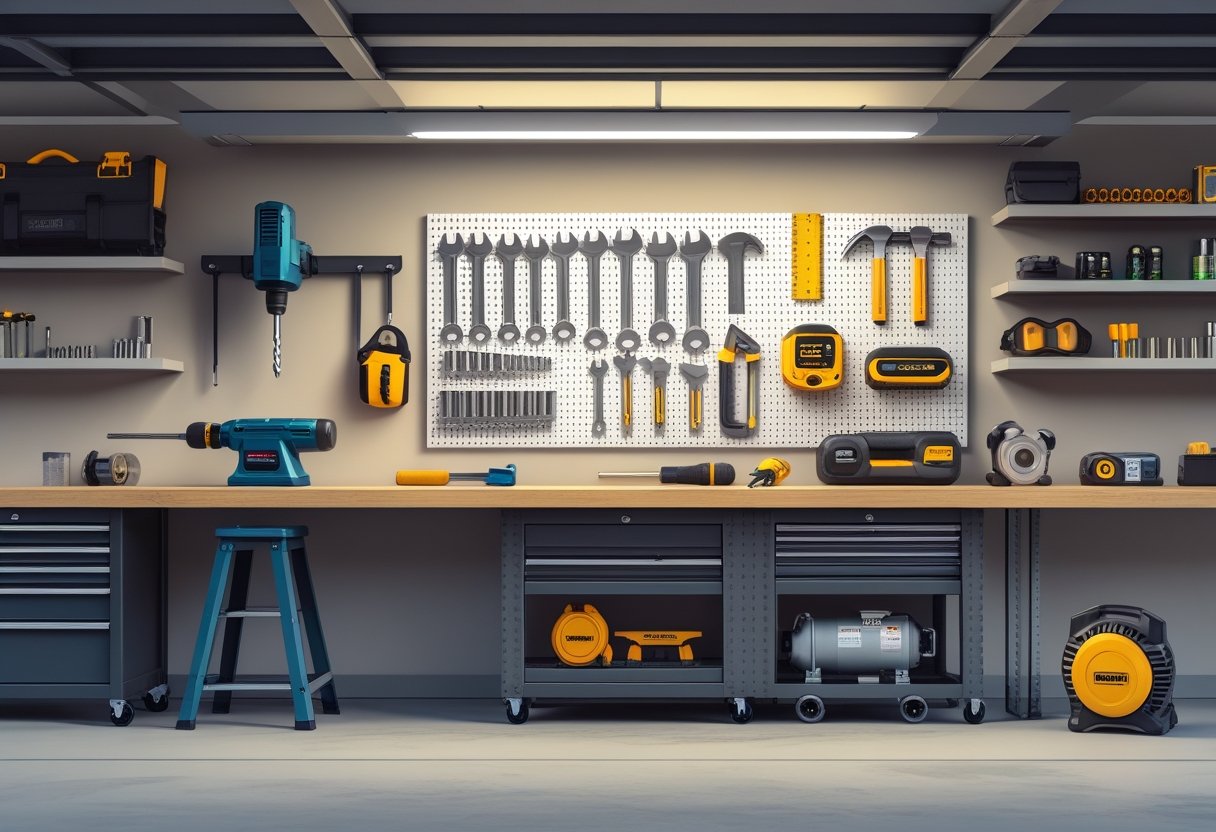
Tools are investments that pay dividends over time through the projects you complete and the skills you develop. From basic repairs to complex builds, having the right tool for the job eliminates frustration and improves results. The essentials range from humble hammers and screwdrivers to more sophisticated power tools that extend your capabilities.
Key Takeaways
- Quality garage tools improve project outcomes while saving time and reducing frustration during home repairs and DIY projects.
- A balanced collection of hand tools, power tools, and specialty equipment creates a versatile workspace for tackling diverse household tasks.
- Proper storage solutions and safety equipment are just as important as the tools themselves for maintaining an efficient and secure garage workshop.
Essential Hand Tools for Every Garage
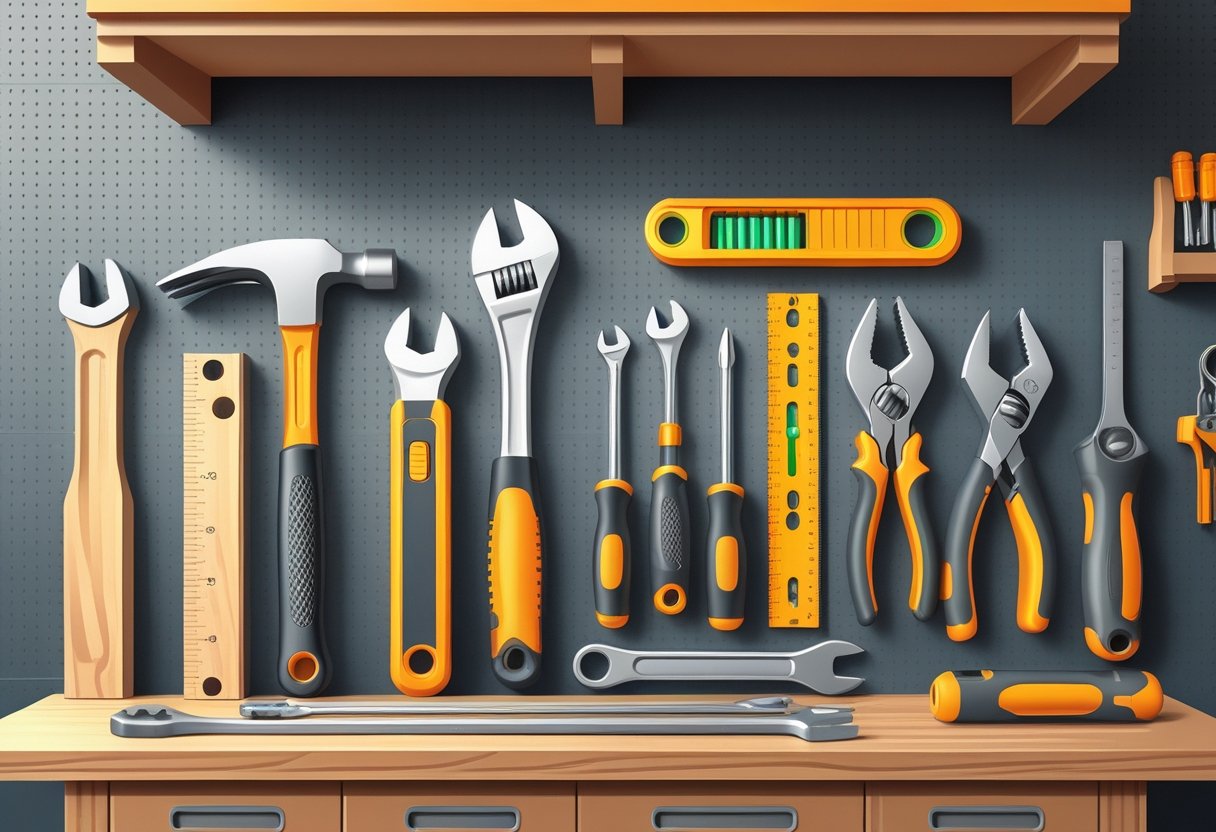
A well-equipped garage needs reliable hand tools for tackling various repairs and projects. Quality hand tools form the foundation of any garage toolkit and often last for decades with proper care.
Socket Set Essentials
A comprehensive socket set is crucial for any garage. Look for sets that include both metric and SAE (standard) sizes to handle different fasteners. Most quality sets come with 1/4-inch, 3/8-inch, and 1/2-inch drive ratchets with corresponding sockets.
Deep sockets help with accessing recessed bolts, while extension bars reach tight spots. Impact sockets, made from tougher materials, are worth considering for use with power tools.
Key components of a good socket set:
- Ratchet handles with quick-release mechanisms
- Both shallow and deep sockets
- Extensions and universal joints
- Socket organizers to prevent loss
Professionals recommend investing in a socket set with at least 72 teeth in the ratcheting mechanism for smoother operation in tight spaces.
Screwdrivers and Pliers
Every garage needs a variety of screwdrivers for different fastener types. A basic set should include both flathead and Phillips head screwdrivers in multiple sizes. Magnetic tips help prevent lost screws.
Precision screwdrivers handle smaller jobs like electronics repairs. Insulated screwdrivers are essential for any electrical work to prevent shocks.
Pliers come in several essential varieties:
- Slip-joint pliers for general gripping tasks
- Needle-nose pliers for reaching tight spaces
- Channel-lock pliers for adjustable gripping power
- Diagonal cutters for snipping wires and small materials
A good set of locking pliers (sometimes called Vise-Grips) serves as portable clamps and can help remove stripped screws or bolts.
Wrenches for Versatile Repairs
Combination wrenches featuring both open and box ends provide flexibility for different fastening situations. The open end slips onto nuts easily, while the box end provides better grip.
Adjustable wrenches eliminate the need for multiple sizes but sacrifice some strength. Most garages should have at least one 6-inch and one 10-inch adjustable wrench.
Specialty wrenches worth considering:
- Allen wrenches (hex keys) for furniture and many automotive applications
- Torque wrenches for precise tightening specifications
- Pipe wrenches for plumbing repairs
Wrench organizers help keep tools accessible and prevent damage. Wall-mounted magnetic strips or dedicated wrench racks make efficient use of space.
High-quality wrenches typically feature chrome vanadium steel construction with a chrome finish that resists corrosion and makes cleaning easier.
Power Tools to Enhance Efficiency
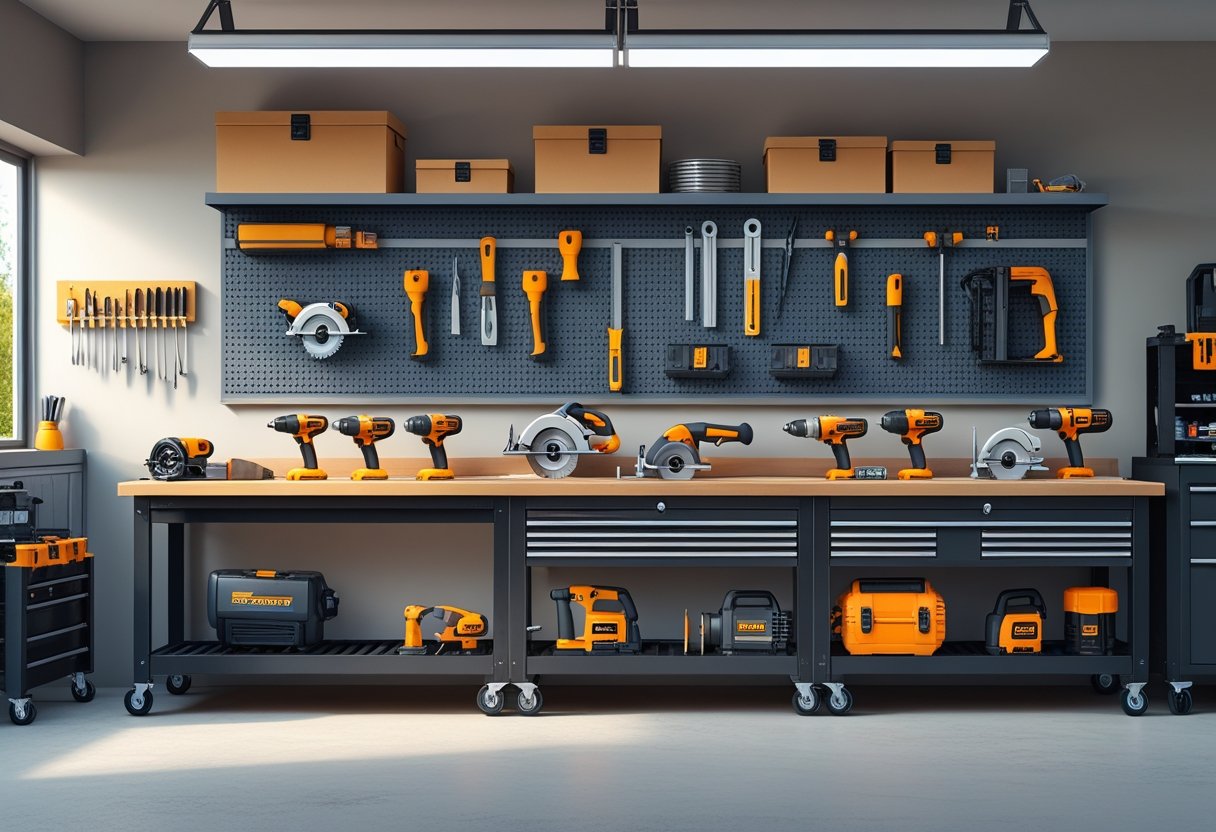
The right power tools can transform your garage work from tedious to enjoyable. These tools save time and energy while delivering professional-quality results for various home improvement projects.
Cordless Drill Applications
A cordless drill serves as the cornerstone of any garage tool collection. With voltage options ranging from 12V to 20V, higher voltage drills provide more power for demanding tasks. Most modern drills feature adjustable clutch settings that prevent stripping screws or damaging materials.
Look for drills with:
- Lithium-ion batteries for longer runtime
- Multiple speed settings
- LED work lights
- Quick-change chucks
Cordless drills excel at drilling holes in wood, metal, and plastic. They also drive screws efficiently for furniture assembly and home repairs.
Many homeowners find value in purchasing drill kits that include multiple batteries. This ensures one battery can charge while the other powers the tool, eliminating downtime during extended projects.
Impact Driver Benefits
Impact drivers deliver rotational force with added hammer-like action that standard drills lack. This design provides superior torque for driving large screws and lag bolts without stripping heads.
Key advantages:
- Up to 3x more torque than standard drills
- Less wrist strain during use
- Compact size fits in tight spaces
- Quick bit changes with hex shanks
Impact drivers work exceptionally well for deck building, fence installation, and furniture construction. The hammering action prevents cam-out (when the bit slips from the screw head), reducing frustration and damaged fasteners.
Most professional contractors now consider impact drivers essential, not optional. For homeowners tackling serious DIY projects, the impact driver offers significant time savings and improved results.
Angle Grinder Uses
Angle grinders feature a rotating disc that cuts, grinds, polishes, and sharpens various materials. These versatile tools typically come in 4.5″ to 9″ sizes, with 4.5″ being most practical for home garages.
Common angle grinder applications include:
- Cutting metal pipes and rebar
- Removing rust and paint
- Sharpening lawn mower blades
- Grinding down welds
- Cutting ceramic tile
Always use the correct disc for each material and task. Diamond discs cut tile and concrete, while flap discs sand and polish metal surfaces.
Safety is paramount when operating angle grinders. Always wear eye protection, gloves, and hearing protection. Keep the guard in place and maintain a firm grip with both hands during operation.
Measuring and Layout Tools
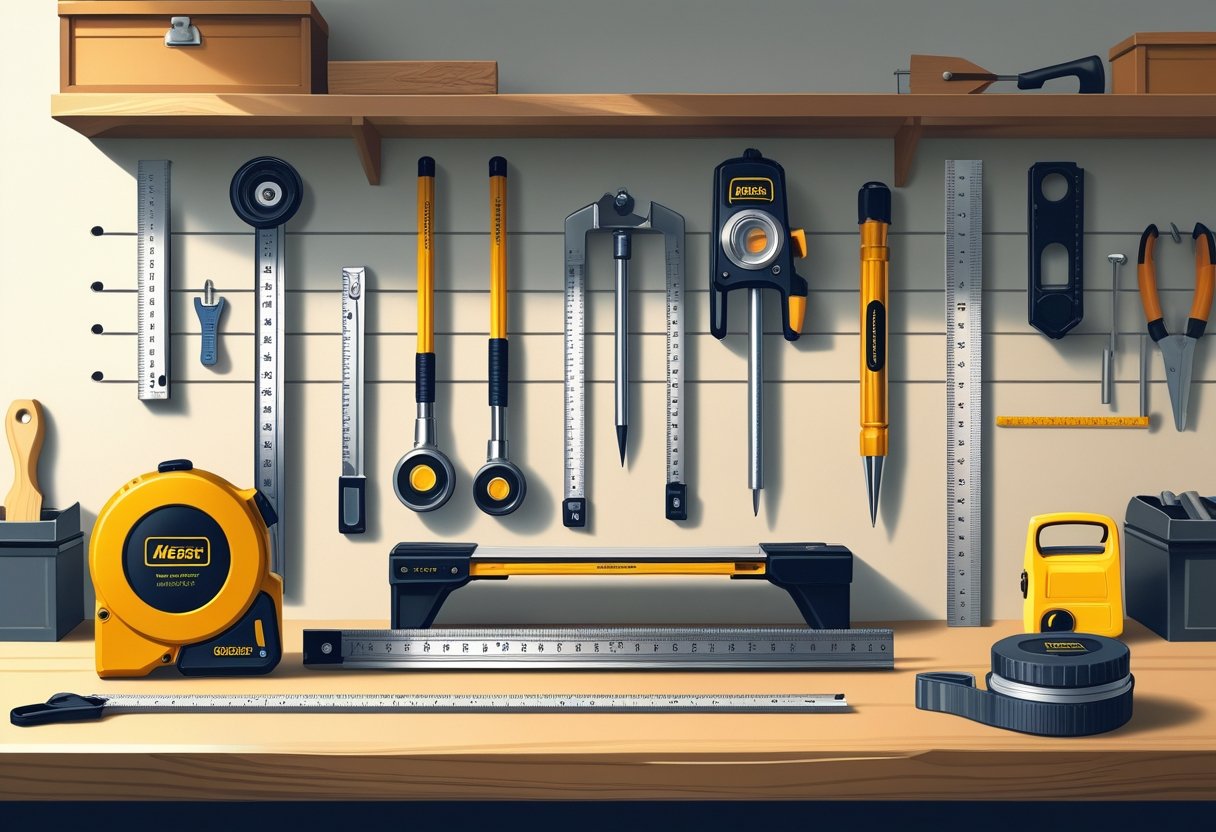
Precise measurements and accurate layouts prevent costly mistakes in garage projects. Having the right measuring tools ensures your work fits together properly and looks professional.
Tape Measures and Levels
A quality tape measure is essential for any garage workshop. Look for one with at least 25 feet of reach and clear, easy-to-read markings. Steel tapes with lock buttons help when measuring alone.
Digital tape measures offer exact readings and can convert between measurement systems with a button press. They’re worth the extra cost for precision work.
Levels are equally important. A 24-inch level works for most projects, but consider a torpedo level for tight spaces. Digital levels show exact angles, making them perfect for installing shelves or hanging cabinets.
Laser levels project straight lines across walls and floors, which is helpful when installing pegboards or planning workbench placement.
Stud Finders for Accurate Installation
A reliable stud finder helps locate wall supports for mounting heavy items. Magnetic stud finders detect nails and screws in studs, offering a budget-friendly option.
Electronic stud finders are more precise. They sense density changes in the wall and can detect not just wooden studs but also metal studs, pipes, and electrical wiring.
Advanced models feature LCD screens that show exactly where studs begin and end. Some even map what’s behind your walls through deep-scanning technology.
When choosing a stud finder, look for one with edge-finding capability. This feature helps you locate the exact edges of studs, ensuring secure mounting for shelves, TV brackets, and heavy tool cabinets.
Automotive and Mechanical Tools
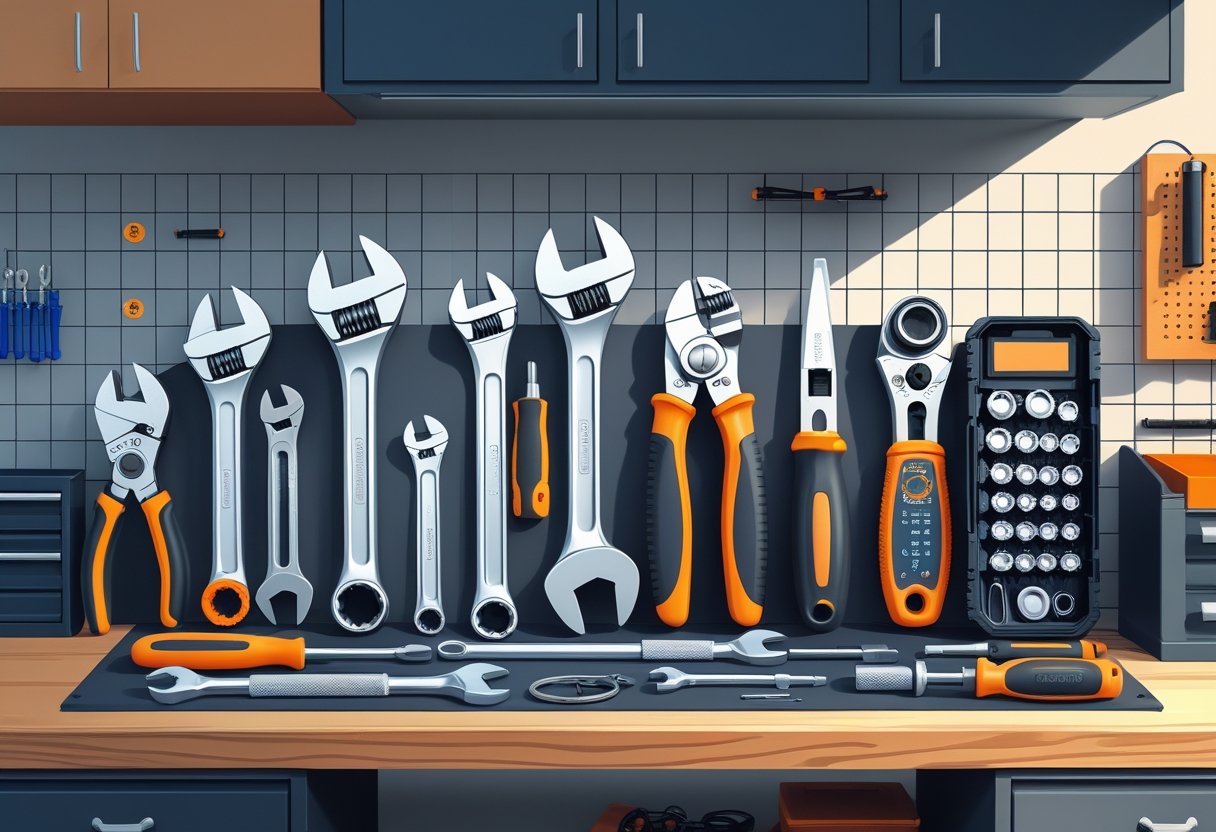
Working on vehicles requires specialized tools that ensure both safety and proper maintenance. These essential items help homeowners tackle basic car repairs without professional assistance.
Jack and Jack Stands
A quality hydraulic floor jack is essential for lifting vehicles safely during maintenance. Look for one with at least a 2-ton capacity for most passenger cars and small trucks. Never rely on a jack alone to hold up a vehicle.
Jack stands are non-negotiable safety equipment. They provide stable support once the vehicle is raised. Always use them in pairs on solid, level ground.
Most homeowners should invest in stands rated for 2-3 tons. Place them at the manufacturer’s recommended lifting points on your vehicle’s frame.
Before getting underneath a raised vehicle, give it a firm shake to verify stability. This simple check could save your life.
Torque Wrench Importance
A torque wrench ensures fasteners are tightened to exact specifications. Over-tightening can strip threads or break bolts, while under-tightening creates safety hazards.
Most home mechanics should own a 3/8-inch drive torque wrench with a range of 10-80 foot-pounds. This covers most automotive applications from oil drain plugs to lug nuts.
Digital torque wrenches offer precise readings and are easier to use for beginners. Traditional click-type wrenches provide tactile feedback when you reach the set torque.
Always store torque wrenches at their lowest setting to maintain calibration. Check the owner’s manual for your vehicle’s specific torque specifications rather than guessing.
Tool Storage and Organization Solutions
A well-organized garage keeps tools accessible and protected from damage. Proper storage systems save time during projects and extend the life of your investments.
Tool Chests and Cabinets
Tool chests and cabinets form the backbone of garage organization. These storage solutions come in various sizes, from portable toolboxes to full-height cabinets.
Rolling tool chests offer mobility with multiple drawers of different depths. The top drawers typically store smaller items like screwdrivers and wrenches, while deeper bottom drawers accommodate larger tools.
Look for models with ball-bearing drawer slides that operate smoothly even when fully loaded. Quality chests feature drawer liners to prevent tools from sliding around.
Steel cabinets provide enclosed storage for bulkier items and supplies that don’t fit in drawers. Many feature include adjustable shelving to customize the interior space.
Consider combination units that integrate both drawers and cabinet space for maximum versatility.
Wall-Mounted Storage Systems
Wall storage systems transform unused vertical space into valuable tool organization zones. Pegboards remain a classic solution, allowing tools to hang within easy reach.
Modern pegboard alternatives include metal grid systems with specialized hooks and holders. These systems support heavier items and offer more configuration options.
Slat wall panels provide another robust option, with channels that accept various accessories like hooks, bins, and shelves.
Magnetic tool strips work excellently for metal tools like wrenches and screwdrivers. They keep frequently used items visible and instantly accessible.
For power tools, wall-mounted racks with dedicated slots protect expensive equipment while keeping batteries and accessories organized nearby.
Safety Equipment for the Garage
Safety should always be your top priority when working in a garage. The right safety equipment protects you from injuries and helps handle emergencies quickly.
Personal Protective Gear
Every garage needs basic protective gear to prevent injuries during projects. Safety glasses shield your eyes from flying debris when cutting, grinding, or hammering. Choose impact-resistant models with side shields for maximum protection.
Work gloves are essential for handling rough materials, chemicals, and hot objects. Keep multiple pairs: leather gloves for heavy work, nitrile gloves for chemical handling, and cut-resistant gloves for sharp objects.
Ear protection prevents hearing damage when using loud power tools. Foam earplugs are inexpensive and disposable, while earmuffs provide more protection for extended use.
Dust masks or respirators filter out harmful particles. Simple dust masks work for light sanding, while respirators with replaceable filters are needed for painting or chemical work.
Fire Extinguishers and First Aid Kits
A fire extinguisher is non-negotiable for garage safety. An ABC-rated extinguisher handles wood, liquid, and electrical fires. Mount it in an easily accessible location, not near potential fire sources.
Check the pressure gauge monthly and have it professionally serviced yearly. Everyone who uses the garage should know how to operate it using the PASS method: Pull, Aim, Squeeze, Sweep.
A comprehensive first aid kit should contain bandages, antiseptic wipes, gauze pads, medical tape, and tweezers. Add eye wash solution for chemical splashes and burn cream for minor burns.
Place the kit in a waterproof container, clearly labeled and easy to reach. Check it regularly to replace expired items and replenish used supplies.
Cleaning and Maintenance Tools
Keeping your garage tools in top condition requires proper cleaning equipment and regular maintenance. The right tools will extend the life of your equipment and create a safer working environment.
Shop Vacuum Advantages
A high-quality shop vacuum is essential for every garage. Unlike regular household vacuums, shop vacs handle debris that would damage standard vacuums, including metal shavings, wood chips, and even small amounts of liquid.
Most shop vacuums offer both wet and dry cleaning capabilities. This versatility means you can clean up spilled fluids as easily as sawdust.
Look for models with HEPA filters if you work with fine particles. These filters trap 99.97% of dust, preventing it from recirculating in your garage air.
Consider storage space when selecting a shop vacuum. Wall-mounted options save valuable floor space, while portable units offer flexibility for cleaning vehicles and hard-to-reach areas.
Air Compressor Applications
An air compressor serves as both a cleaning and maintenance tool. For cleaning, it blasts away dust from equipment, tools, and tight spaces unreachable by vacuums.
Air compressors also power pneumatic tools like impact wrenches and paint sprayers. This makes them multi-functional investments for your garage.
Maintenance tasks become easier with compressed air. You can quickly inflate tires, sports equipment, and check pressure with proper attachments.
When selecting an air compressor, consider the CFM (Cubic Feet per Minute) rating. Higher CFM allows for more demanding applications like operating air-hungry tools.
Noise levels matter too. Modern compressors offer quieter operation—an important feature if your garage is attached to your home.
Lighting Solutions for Workspaces
Good lighting in your garage workspace prevents accidents and helps you see details clearly. Proper illumination reduces eye strain during long projects and makes finding small parts easier.
LED Work Lights
LED work lights offer the best combination of brightness and energy efficiency for garage spaces. These lights consume up to 80% less power than traditional incandescent bulbs while lasting 25 times longer. A quality LED shop light provides between 4,000-6,000 lumens of illumination, ideal for detailed work.
Popular LED options include:
- Ceiling-mounted shop lights (2-4 foot fixtures)
- Adjustable arm lights for workbenches
- Under-cabinet strip lighting
LED lights produce minimal heat, making them safer around flammable materials. They also start instantly in cold temperatures, unlike fluorescent tubes that may flicker in unheated garages.
Most LED work lights now offer color temperature options. Choose 5000K-6500K (daylight) for the best color accuracy when working on projects.
Portable Lighting Options
Portable lights provide focused illumination exactly where needed in your garage workspace. Rechargeable options eliminate the hassle of cords and allow flexibility.
Essential portable lighting tools:
- Headlamps (250-500 lumens) for hands-free work
- Magnetic work lights that attach to metal surfaces
- Collapsible tripod lights for whole-area illumination
Battery technology has improved dramatically. Modern lithium-ion rechargeable lights run 4-8 hours on a single charge and recharge in under 2 hours.
Look for portable lights with adjustable brightness settings to conserve battery life. Many now include red light modes to preserve night vision or flashing modes for emergencies.
Waterproof and impact-resistant models (look for IPX4 rating or higher) withstand the garage environment better. Some advanced models even include USB ports to charge your phone while working.
Specialty Tools for Home Projects
Every well-equipped garage needs specialty tools that help tackle specific home maintenance tasks. These tools save time and prevent damage when handling electrical work or dealing with stubborn fasteners.
Multimeters for Electrical Tasks
A digital multimeter is essential for any garage that handles electrical repairs. This tool measures voltage, current, and resistance in electrical systems. Most homeowners benefit from a basic model with auto-ranging capabilities, which automatically selects the appropriate measurement range.
When selecting a multimeter, look for one with a continuity test function. This feature beeps when a circuit is complete, making it easier to identify breaks in wiring.
Many models now include non-contact voltage detection, which can detect live wires without direct contact. This safety feature helps prevent electrical shocks during repairs.
For basic household tasks, a multimeter in the $30-$50 range offers sufficient accuracy and durability. Store it in a dry location, as moisture can affect its precision and performance.
Stud Extractors and Specialty Sockets
Stud extractors remove broken bolts and studs that regular tools can’t grip. A quality set typically includes multiple sizes to handle various fasteners. Look for extractors made from hardened steel, as they resist wear better than standard options.
Specialty sockets come in several types:
- Impact sockets: Designed to withstand the force of impact wrenches
- Swivel sockets: Feature a pivoting design for reaching fasteners at difficult angles
- Torx sockets: Handle star-shaped fasteners common in modern appliances
A socket adapter set is also valuable, allowing standard sockets to work with different drive sizes. This versatility eliminates the need for duplicate tools.
For vehicle maintenance, consider investing in axle nut sockets and oxygen sensor sockets. These specialized tools prevent damage to critical components during repairs.
Conclusion
Having these essential tools in your garage will make home repairs and DIY projects much easier. You don’t need to buy everything at once. Start with basics like screwdrivers, pliers, and a quality drill.
Build your collection over time as you take on more complex projects. Quality matters more than quantity when it comes to tools. A few well-made items will serve you better than many cheap ones.
Remember to store your tools properly to extend their life. Wall-mounted pegboards or toolboxes keep everything organized and accessible.
Safety should always be your priority. Invest in protective gear like gloves and safety glasses before starting any project.
With these ten must-have tools, you’ll be prepared to handle most household repairs and improvements. Your garage will become a functional workspace where you can tackle projects with confidence.